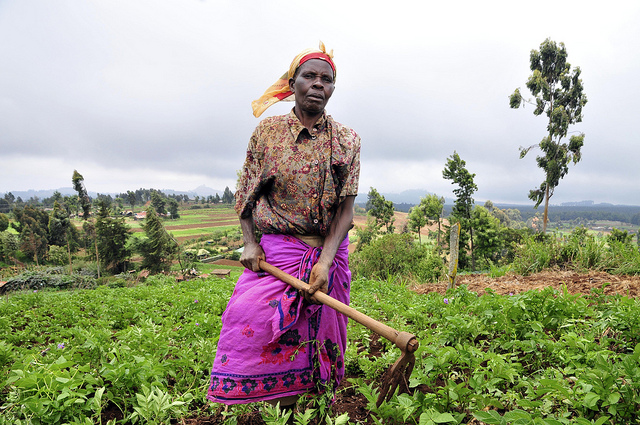UN Commission on Status of Women
Maryknoll Sister Veronica Schweyen, who was on mission for more than forty years in Tanzania and is a volunteer with the Maryknoll Office for Global Concerns, reports on the sixtieth session of the Commission on the Status of Women at the United Nations in March.
Maryknoll Sister Veronica Schweyen, who was on mission for more than forty years in Tanzania and is a volunteer with the Maryknoll Office for Global Concerns, reports on the sixtieth session of the Commission on the Status of Women at the United Nations in March. The following article was published in the May-June 2016 issue of NewsNotes.
The sixtieth session of the Commission on the Status of Women (CSW) took place at the United Nations Headquarters in New York over two weeks in March. Among the hundreds of representatives of member states, UN entities, and ECOSOC-accredited NGOs in attendance were Maryknoll Sisters Elizabeth Zwareva, Genie Natividad, Laura Guledew, Anastasia Lindawati, Jareen Aquino, Roni Schweyen, Meg Gallagher, Jean Fallon, and Maryknoll Father Jim Noonan.
The Commission on the Status of Women is the principal body at the UN exclusively dedicated to the promotion of gender equality and the empowerment of women. Usually held for ten days in March, the session provides an opportunity to review progress towards gender equality and the empowerment of women, identify challenges, set global standards and norms and formulate policies to promote gender equality and women’s empowerment worldwide. The session is also an opportunity for policy makers, advocates, researchers and activists to network and strategize, mobilize and plan new initiatives and actions to further the cause of gender equality and women’s empowerment.
The commission addressed as its priority theme “women’s empowerment and its link to sustainable development.” In addition, it evaluated progress in the implementation of the agreed conclusions from the fifty-seventh session (2013) on “the elimination and prevention of all forms of violence against women and girls.”
In the opening ceremony, UN Secretary-General Ban Ki-moon noted that there are still four countries where not a single woman is in the parliament and eight countries without any women in the cabinet. Ban said that women around the world still experience many forms of violence, and this meeting would address ways to end gender-based violence. Ban also stated that he hoped that, due to the commission’s efforts, “FGM” would stand for “finally girls matter” rather than “female genital mutilation.”
In a small group presentation, Ms. Yoko Hayashi, a lawyer from Japan and chair of the Committee on the Elimination of Discrimination against Women, said the eradication of poverty must be a primary goal, since, with that, women are free to choose their own goals. A representative from Holland replied, “We’re seeing the feminization of poverty. This is an area in most countries where we see that we must end violence against women.”
Discrimination and bias against women are deep-rooted problems in almost all societies. Maryknoll Sisters witness gender-based discrimination in East Africa where many families are small-scale farmers and cultural norms assign women the majority of the work in growing crops. When harvesting is done, the men typically take control of the finances and the women do not benefit from their labor. Another factor in gender-based discrimination is climate change. Women in developing countries bear the brunt of devastating impacts of climate change – extreme weather patterns, drought, erratic rainfall – since they are often pushed to the poorest land, the least water, and face the largest barriers to access to agricultural programs and services for support.
The sixtieth session of the commission came to an end with the adoption of agreed conclusions. The long list includes calls for enhancing the basis for rapid progress, including stronger laws, policies and institutions, better data and scaled-up financing. In particular, the commission named the need for laws that ensure women and girls claim their rights and can participate in policy- making on issues that directly affect their lives.
One presenter stated that women are ‘agents of change’ in the world yet often victims of violence because of that, as we saw in the murder of environmental and indigenous rights activist Berta Cáceres in Honduras on March 3. The extraction of resources in many places of the world breeds violence by companies and governments against indigenous peoples, especially women.
In a sobering session on gender-based violence, the presenters stated that 938 million women will experience gender-based violence this year alone. A delegate from Australia argued that the first step to end gender-based violence is through the rule of law. The Australian government is examining and changing norms that block women’s development and changing laws that show women in lesser positions, such as inheritance laws.
Some countries can do much more to ensure gender equality and the empowerment of women. The Commission on the Status of Women is strategically placed to provide a platform for women around the world to speak for themselves and collectively amplify their voices. When we see or hear of gender inequalities, we need to continuely ask at local, national, and international levels “Are women’s human rights being respected?”
Photo: A Kenyan farmer at work in the Mount Kenya region. Photo by Flickr/Neil Palmer (CIAT) and licensed in the creative commons 2.0.

